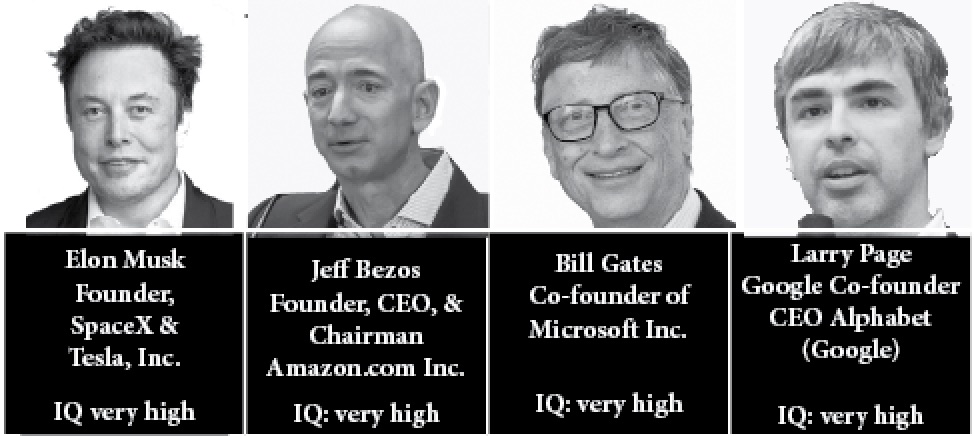
Those who have accumulated wealth, rather than inherited it, share certain character traits that are manifest in a variety of different forms. Though some have accumulated substantial wealth through employment and investment, almost all the world’s billionaires are entrepreneurs. When we look at the character traits of these entrepreneurs, what do we discover?
At the beginning of 2022, ForbesMedia ranked on its World’s Real-Time Billionaires website, the world’s wealthiest billionaires. The table below from Intelligence, IQ & Perception displays the net worth and the educational backgrounds of the top 10 in the rich list–most of them having specialized in mathematics and computer science. Their IQs are estimated from their scholastic records, SAT scores, and the calibre of the universities at which they were accepted. Where SAT scores are unknown, the institution at which an applicant is accepted is a reasonably good indicator of his SAT score and, in turn, his IQ.
| The Ten Richest People in the World in 2022 | |||
| Person | Wealth | Education | Estimated IQ |
| Elon Musk | $271.7 B | BS economics, BA physics U of Penn | very high |
| Bernard Arnault | $199.5 B | École Polytechnique de Paris | high to very high |
| Jeff Bezos | $192.6 B | B.S.E. at Princeton | very high |
| Bill Gates | $138.3 B | SAT 1590 out of 1600, then Harvard | very high |
| Larry Page | $123.5 B | M.S. Computer Science at Stanford | very high |
| Mark Zuckerberg | $120.3 B | Computer Science at Harvard | very high |
| Larry Ellison | $119.7 B | Dropped out of U. of Illinois | high to very high |
| Sergey Brin | $119.0 B | M.S. Computer Science at Stanford | very high |
| Warren Buffett | $108.6 B | Wharton and M.S. at Columbia U. | very high |
| Steve Ballmer | $105.8 B | B.S. Math and Economics at Harvard | very high |
Elon Musk earned degrees in Economics and Physics and was enrolled in a Ph.D. program at Stanford before dropping out to found his first company. Jeff Bezos, identified as “gifted” in elementary school, was accepted at Princeton and subsequently graduated summa cum laude in electrical engineering and computer science. Bill Gates, with a reported IQ of 160, achieved a near perfect score of 1590 out of 1600 on his SATs and was accepted into Harvard where he studied law, mathematics, and computer science. Larry Page’s father was a computer science professor at Michigan State University where his mother taught computer programming. Following a stellar academic career that brought him to Stanford, Larry predictably pursued a Ph.D. in computer science. His thesis supervisor Terry Winograd suggested that he investigate how the articles on the World Wide Web were linked. Pursuing this suggestion, Page embarked on a project he called “BackRub” that would trace each page on the web back to its antecedents. This would eventually enable the identification of the seminal sources from which the other links emerged. as “the most empowering invention since Gutenberg’s printing press.”
Although high intelligence can be a very important factor in becoming a wealthy entrepreneur, there are many intelligent people who never realize their dreams, because they lack other important attributes that are vital to success. In her 2016 book Grit: The Power of Passion and Perseverance, psychologist Angela Duckworth, winner of the prestigious MacArthur Fellowship, argues that grit, a unique combination of passion and perseverance, is a vital component of success in any endeavour. However, her research has revealed that talent also plays a role. She states, “Are we all equally talented? No and no. The ability to quickly climb the learning curve of any skill is obviously a good thing, and, like it or not, some of us are better at it than others.”
However, one of the vital qualities for success as an entrepreneur that is missing in many high-intelligence people is a tolerance for risk. Many hi-Q people are risk averse and are therefore unwilling to put everything on the line in the pursuit of a dream. Jeff Bezos may be taken as the poster person for this proclivity, for In 1994, he quit his million-dollar-a-year job as Vice-President at D. E. Shaw to pursue a wild dream. Observing the emergence of the internet and envisaging a universal bookstore in cyberspace, he dipped into his savings to incorporate his dream. Within a decade, his fledgling company had expanded into the behemoth that eventually became America’s leading online retailer–known today as Amazon.com. On route to this destination, he nearly went bankrupt several times, but eventually emerged as the richest man in the world in 2020. Such risk-taking is anathema to many highly intelligent people who fail to achieve their goals in the field of business.
Dr. Gene Landrum in a comprehensive study of great entrepreneurs and supreme athletes has described in some depth the personality qualities important for success in these two domains. In his book Entrepreneurial Genius: The Power of Passion, he describes these qualities in some depth and includes a questionnaire that enables the reader to assess his or her own suitability to a career as an entrepreneur. A copy of that questionnaire and the scoring guide is accessible at: https://www.intelligence-and-iq.com/do-you-have-the-entrepreneurial-personality/. While intelligence will be an advantage in helping you “get off the ground”, a host of other personality traits, such as those described above are necessary to propel you into the stratosphere of the billionaires.
